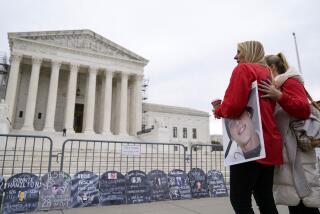Heart Valve Maker Offers to Settle Lawsuits
- Share via
Pharmaceutical giant Pfizer Inc. on Friday announced a proposal to spend up to $205 million to settle hundreds of lawsuits arising from a potentially faulty heart valve that has been blamed for about 265 deaths.
But attorneys for some of the 55,000 people who have received implants of the artificial valves, manufactured by Pfizer’s Irvine-based Shiley Inc. subsidiary, were chilly to the proposal. The $2,000 to $4,000 that Pfizer will offer patients whose valves have not failed is grossly inadequate, they said.
“This matter does nothing to compensate for their primary element of damage, which is their stark terror that their valve may malfunction at any moment and kill them,” said Vance C. Simonds Jr., who represents 89 patients whose valves have not broken but who are suing Pfizer and Shiley for emotional distress and fraud.
For years, Pfizer has paid undisclosed settlements to families of patients who died when their valves fractured. But, with just one exception, it has refused to pay claims by those whose valves are working.
Friday’s proposal reversed that policy.
The first group of more than 400 such “fear of fracture” suits are expected to come to trial in Orange County Superior Court this year. The cases pose a novel legal question: Should a patient implanted with a life-saving heart valve that has a tiny risk of failure be compensated for their anxiety?
The manufacturer says no. “We do not believe that there is any basis for a claim when people have a valve that is functioning,” said Shiley spokesman Robert Fauteux.
Some states do not permit claims for emotional injury unless the litigant has suffered physical harm or been sold a product that failed. So patients from across the country have flocked to file suit in California, where an appeals court has ruled that patients can collect damages if they can prove fraud.
Pfizer has offered a settlement to fewer than a dozen patients that must be approved by a court in Cleveland. But the same offer is open to all Shiley valve recipients. If they accept, the proposed total $205-million settlement would limit Pfizer’s liability if it were to lose the California cases.
The settlement offer marks Pfizer’s latest attempt to rid itself of a corporate albatross. Pfizer bought Shiley in 1979, just one month before the Bjork-Shiley 60-degree Convexo-Concave heart valve went on the market.
Some valves had fractured before reaching the market, but the federal Food and Drug Administration approved the device based on data submitted by Shiley. That data, which the FDA now calls “misleading,” purported to show that the Shiley valve was far superior to other heart valves then on the market and that its benefits outweighed the risks.
Fewer than 1% of the valves have fractured, according to the company. Plaintiffs’ attorneys put the failure rate as high as 4%. What is not in dispute is that about two-thirds of the 461 patients whose valves had malfunctioned as of November have died within hours.
Shiley pulled the valve off the market in 1986. It has since been scolded by the FDA and a congressional committee, and accused in several hundred lawsuits of fraudulently overstating the benefits of its valves and ignoring or covering up production defects. The company insists it did nothing wrong.
In December, Pfizer sold most of Shiley’s assets to SNIA BPF S.p.A., a subsidiary of the Fiat group in Milan, Italy. Shiley was left as a shell to deal with the litigation and conduct research aimed at helping heart valve patients. Pfizer announced it would set aside $300 million as a reserve to compensate future valve-fracture victims. The onetime charge wiped out the company’s earnings for the fourth quarter of 1991.
Second, Pfizer said it has agreed to establish a fund of $80 million to $130 million for Shiley heart valve recipients worldwide.
Each patient will receive a lump-sum payment of between $2,000 and $4,000, depending on how many of the 55,000 eligible patients accept the settlement, Fauteux said. The money is intended to pay for consultations with cardiologists, but no conditions are attached to its use, he said.
Pfizer also said that it is earmarking $75 million for the Heart Valve Research Center in Irvine, which is working on ways to identify those patients whose valves are at highest risk of fracture. Finally, the company said it will guarantee compensation to patients “in the unlikely event of valve fracture.”
However, attorney Bruce Finzen, who represents about 370 patients whose valves are working and the families of 12 whose valves failed, said he would be “astounded” if any of his California clients took the offer.
Even if patients use the settlement to consult a cardiologist, “there isn’t any non-invasive method (short of open-heart surgery) right now known to detect an incipient fracture,” Finzen said.
Pfizer general counsel Paul Miller called the offer “a prudent way to resolve complex, time-consuming litigation.”
Pfizer stock, which has more than doubled since last year on the strength of several new drugs, gained 87.5 cents Friday to close at $76.125 per share.
More to Read
Inside the business of entertainment
The Wide Shot brings you news, analysis and insights on everything from streaming wars to production — and what it all means for the future.
You may occasionally receive promotional content from the Los Angeles Times.










